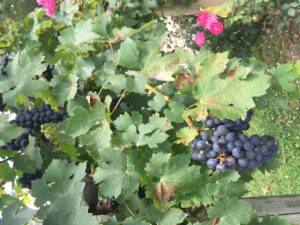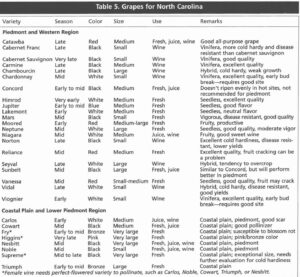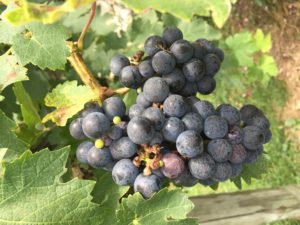Growing Grapes in Western NC
go.ncsu.edu/readext?948067
en Español / em Português
El inglés es el idioma de control de esta página. En la medida en que haya algún conflicto entre la traducción al inglés y la traducción, el inglés prevalece.
Al hacer clic en el enlace de traducción se activa un servicio de traducción gratuito para convertir la página al español. Al igual que con cualquier traducción por Internet, la conversión no es sensible al contexto y puede que no traduzca el texto en su significado original. NC State Extension no garantiza la exactitud del texto traducido. Por favor, tenga en cuenta que algunas aplicaciones y/o servicios pueden no funcionar como se espera cuando se traducen.
Português
Inglês é o idioma de controle desta página. Na medida que haja algum conflito entre o texto original em Inglês e a tradução, o Inglês prevalece.
Ao clicar no link de tradução, um serviço gratuito de tradução será ativado para converter a página para o Português. Como em qualquer tradução pela internet, a conversão não é sensivel ao contexto e pode não ocorrer a tradução para o significado orginal. O serviço de Extensão da Carolina do Norte (NC State Extension) não garante a exatidão do texto traduzido. Por favor, observe que algumas funções ou serviços podem não funcionar como esperado após a tradução.
English
English is the controlling language of this page. To the extent there is any conflict between the English text and the translation, English controls.
Clicking on the translation link activates a free translation service to convert the page to Spanish. As with any Internet translation, the conversion is not context-sensitive and may not translate the text to its original meaning. NC State Extension does not guarantee the accuracy of the translated text. Please note that some applications and/or services may not function as expected when translated.
Collapse ▲Growing grapes in the home garden can be a little bit of work but it is definitely worth it. Fresh bunch grapes are a tasty summer treat. Wine made from homegrown grapes is great as well.
Why Not Muscadines in WNC?
Before we talk about growing grapes we need to establish that muscadine grapes do not grow well in our area. From our publication on muscadines: “Muscadine grapes are well adapted to the Coastal Plain (east) of North Carolina, where temperatures seldom fall below 10°F. Considerable injury generally occurs where winter temperatures drop below 0°F. Some of the more hardy cultivars such as ‘Magnolia,’ ‘Carlos’ and ‘Sterling’ survive northward to Virginia and westward to the foothills of the Blue Ridge Mountains.”







